
Immunological Medicine
Scope & Guideline
Illuminating the Complexities of the Immune Response
Introduction
Aims and Scopes
- Autoimmunity and Immune Pathogenesis:
The journal extensively explores the immunological mechanisms underlying autoimmune diseases, including systemic lupus erythematosus, rheumatoid arthritis, and myositis, aiming to elucidate disease pathogenesis and potential therapeutic targets. - Genetic and Molecular Insights:
Research often includes genetic analyses and molecular studies that investigate the shared genetic backgrounds of autoimmune diseases, the role of specific genes and proteins, and their implications in disease progression and treatment. - Therapeutic Approaches and Innovations:
The journal publishes studies on novel therapeutic strategies, including the application of biologics, small molecules, and immunotherapies, highlighting case studies and clinical trials that showcase efficacy and safety. - Cellular and Molecular Immunology:
A significant focus is placed on cellular immunology, including studies on immune cell populations such as T cells, B cells, macrophages, and their roles in disease states, often utilizing advanced techniques like single-cell RNA sequencing. - Clinical Practice and Guidelines:
Immunological Medicine contributes to the field by providing clinical insights, practice guidelines, and reviews that aid clinicians in managing complex autoimmune conditions effectively.
Trending and Emerging
- Impact of COVID-19 on Autoimmunity:
Recent studies addressing the effects of COVID-19 vaccination and infection on autoimmune disease flares and immune responses highlight the pandemic's influence on immunological research, emphasizing the need for understanding these interactions. - Single-Cell Technologies:
The application of single-cell RNA sequencing and other advanced technologies to dissect immune cell heterogeneity and functions is gaining traction, providing deeper insights into the complexities of immune responses in autoimmune diseases. - Biologics and Novel Therapeutics:
There is an increasing focus on the development and evaluation of biologics and targeted therapies, such as JAK inhibitors and monoclonal antibodies, reflecting a shift towards personalized medicine in treating autoimmune conditions. - Genetic and Epigenetic Influences on Immunity:
Emerging research on the genetic and epigenetic factors influencing autoimmunity is becoming more prominent, providing a better understanding of disease susceptibility and mechanisms. - Inflammation and Metabolism:
Studies exploring the intersection of inflammation and metabolic processes in autoimmune diseases are on the rise, indicating a broader perspective on how metabolic dysregulation can influence immune responses.
Declining or Waning
- General Immunology Reviews:
There has been a noticeable decline in general reviews of immunology, with fewer publications focusing on broad overviews without specific disease context. Researchers are increasingly seeking targeted studies that provide in-depth insights into specific conditions. - Traditional Diagnostic Methods:
Research related to conventional diagnostic techniques seems to be waning, as the field moves towards more innovative and precise diagnostic approaches, such as molecular diagnostics and biomarkers. - Non-Autoimmune Conditions:
The journal's emphasis on non-autoimmune diseases appears to be decreasing, with a stronger focus on autoimmune disorders and related immunological phenomena overshadowing other areas. - Historical Perspectives on Immunology:
Publications that discuss historical or foundational theories in immunology are less frequent, as the journal shifts towards contemporary issues and cutting-edge research.
Similar Journals

Autoimmune Diseases
Exploring innovative treatments for autoimmune disorders.Autoimmune Diseases is a leading open-access journal published by Hindawi Ltd, dedicated to advancing the understanding and treatment of autoimmune disorders. Since its inception in 2010, this journal has provided a vital platform for researchers, clinicians, and students to share innovative findings and insights from the field of immunology. With an impressive Scopus ranking that highlights its relevance, particularly in the areas of Immunology and Microbiology and Immunology and Allergy, Autoimmune Diseases occupies a key position in the scientific discourse, ranking in the top quartiles across various categories. Researchers publishing in this journal benefit from a wide audience and high visibility, reflecting the increasing importance of understanding autoimmune diseases in today’s health landscape. Accessible to all, the journal promotes collaborative research and discussion, making it an essential resource for anyone dedicated to the study and management of autoimmune conditions.
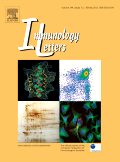
IMMUNOLOGY LETTERS
Advancing Immunological Insights for Global ImpactIMMUOLOGY LETTERS, published by Elsevier, is a distinguished journal in the field of immunology, focusing on the latest advancements and findings that significantly influence immunological research and clinical applications. Established in 1979, the journal has evolved to cater to a global readership, featuring high-quality peer-reviewed articles across a diverse spectrum of topics related to immunity and allergic responses. With an impressive Q2 category ranking in both Immunology and Allergy as of 2023, it holds a strong position within the scientific community, evidenced by its commendable Scopus rankings (Rank #71/233 in Medicine - Immunology and Allergy and Rank #85/236 in Immunology and Microbiology - Immunology). While primarily subscription-based, the journal aims to foster knowledge dissemination that encourages collaboration among researchers and practitioners alike, making significant contributions to the understanding of immune mechanisms. The journal is integral for educators, students, and professionals aiming to stay abreast of current trends and breakthroughs in the immune system's intricate functions.

EUROPEAN JOURNAL OF IMMUNOLOGY
Cultivating Excellence in Immunology ResearchWelcome to the European Journal of Immunology, a premier peer-reviewed journal dedicated to advancing the field of immunology and allergy research. Established in 1971 and published by Wiley, this esteemed journal has been consistently ranked in the top quartile (Q1) across its categories, highlighting its significant impact within the scientific community. With an impressive Scopus ranking, the journal occupies the 64th position in Immunology and Allergy and the 74th in the broader sector of Immunology and Microbiology, demonstrating its vital role in driving innovation and knowledge in immunological studies. The European Journal of Immunology publishes high-quality original research, comprehensive reviews, and insightful commentary, making it an indispensable resource for researchers, healthcare professionals, and students dedicated to understanding the complexities of the immune system. Although not an open-access journal, it offers various subscription options to ensure that institutions and individuals can access pivotal research that shapes the future of immunology.
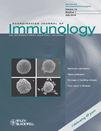
SCANDINAVIAN JOURNAL OF IMMUNOLOGY
Innovative Discoveries Shaping the Future of ImmunologyScandinavian Journal of Immunology is a prestigious peer-reviewed journal published by Wiley, focused on the evolving field of immunology and its interdisciplinary ties with medicine. Since its inception in 1972, this journal has cultivated a rich repository of knowledge, showcasing innovative research and reviews that contribute to the understanding of immune system functions, disorders, and therapeutic interventions. With an impressive impact factor reflecting a Q2 ranking in Immunology and a top-tier Q1 status in miscellaneous Medicine categories for 2023, it is recognized for its high-quality scholarly output, positioning it among the leading journals in the field. Additionally, its Scopus ranking of #84 out of 236 in Immunology underscores its significance and relevance to both emerging and established researchers. Although it does not currently offer open access options, the journal’s expansive reach and rigorous publication standards make it an essential platform for disseminating impactful research to the global scientific community. The journal invites submissions that explore the complexities of the immune system, aiming to bridge clinical and basic science for a comprehensive understanding of immunological phenomena.
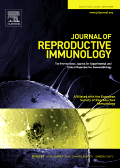
JOURNAL OF REPRODUCTIVE IMMUNOLOGY
Innovating the understanding of immune influences on reproduction.The JOURNAL OF REPRODUCTIVE IMMUNOLOGY, published by Elsevier Ireland Ltd, stands as a pivotal platform for exploring the intricate interactions between reproductive health and the immune system. With an ISSN of 0165-0378 and an E-ISSN of 1872-7603, this esteemed journal spans over four decades, from 1979 to 2024, contributing significantly to the fields of Immunology, Reproductive Medicine, and Obstetrics and Gynecology. Currently ranked in Q2 for Immunology and Allergy and Q1 for both Obstetrics and Gynecology and Reproductive Medicine, it serves as an invaluable resource for researchers, professionals, and students dedicated to advancing knowledge in reproductive health. The journal’s notable impact factor and rigorous peer-review process underscore its commitment to high-quality research, making it an essential reference point for ongoing studies in this ever-evolving discipline. By promoting interdisciplinary discussions and pioneering research findings, the JOURNAL OF REPRODUCTIVE IMMUNOLOGY fosters a deeper understanding of the immune mechanisms that influence reproductive outcomes.
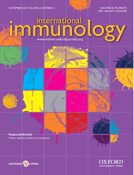
INTERNATIONAL IMMUNOLOGY
Leading the Charge in Immunological Discoveries and Developments.INTERNATIONAL IMMUNOLOGY, published by OXFORD UNIV PRESS, stands out as a premier journal in the field of immunology, providing a vital platform for disseminating groundbreaking research and innovative developments within the discipline. With an impressive Q1 ranking in Immunology and Allergy, as well as in Medicine (miscellaneous), it consistently showcases high-impact studies that contribute to the advancement of immunological knowledge. The journal spans over three decades, from its inception in 1989 to its ongoing contributions as of 2024, thus solidifying its reputation in the scientific community. Researchers, professionals, and students will find valuable articles that delve into the complexities of immune responses, therapeutic interventions, and emerging immunological paradigms, ensuring INTERNATIONAL IMMUNOLOGY remains at the forefront of knowledge in the life sciences.

Immunity
Illuminating the path to understanding immune mechanisms.Immunity is a premier journal published by CELL PRESS that has positioned itself at the forefront of immunological research since its inception in 1994. With its ISSN 1074-7613 and E-ISSN 1097-4180, this prestigious journal is recognized for its significant contribution to the fields of Immunology, Allergy, and Infectious Diseases, consistently achieving a Q1 ranking in these categories as per 2023 metrics. The journal is highly esteemed within the academic community, holding impressive Scopus rankings—4th out of 344 in Infectious Diseases and 3rd in both Immunology and Immunology and Allergy—placing it in the 98th percentile. Although not an Open Access journal, it provides critical insights and research developments that empower researchers, healthcare professionals, and students alike. With a commitment to advancing scientific knowledge, Immunity is crucial for those interested in understanding immune responses and their implications for health and disease.
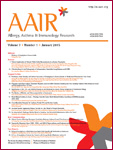
Allergy Asthma & Immunology Research
Pioneering research for a healthier tomorrow.Allergy Asthma & Immunology Research, published by the Korean Academy of Asthma Allergy & Clinical Immunology, is a leading journal dedicated to advancing the fields of immunology, allergy, and respiratory medicine. With an ISSN of 2092-7355 and an E-ISSN of 2092-7363, this esteemed publication has been a cornerstone for researchers and practitioners since its inception in 2009 and continues to disseminate critical findings through till 2024. The journal is ranked in the Q3 category in Immunology and the Q2 category in Immunology and Allergy as well as Pulmonary and Respiratory Medicine, illustrating its impact in these vital fields. With a solid Scopus ranking in multiple sub-disciplines, the journal not only contributes to the scientific discourse but also promotes innovative research and clinical practices. Although currently operating without an open access model, the journal remains highly regarded for its thorough peer-review process and commitment to academic excellence, making it an essential resource for professionals, researchers, and students passionate about advancing knowledge in allergy, asthma, and immunology.
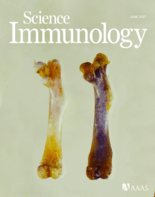
Science Immunology
Advancing the Frontiers of Immune ResearchScience Immunology, published by the American Association for the Advancement of Science, is a leading journal in the field of immunology, recognized for its significant impact and rigor in advancing our understanding of immune responses and complex diseases. With an impressive impact factor that places it in the Q1 category of both immunology and allergy, as well as miscellaneous medicine, this journal is ranked #7 and #8 in their respective Scopus categories, reflecting its high-quality research output. Since its inception in 2016, Science Immunology has been at the forefront of interdisciplinary immunological research, fostering crucial insights that link immunology with pressing health challenges. The journal is committed to providing open access to its content, ensuring that groundbreaking findings are accessible to a global audience of researchers, professionals, and students. Its anthology not only addresses fundamental immunological mechanisms but also enhances the dialogue on translational applications and therapeutic interventions, solidifying its position as an essential resource within the scientific community.

Immunity Inflammation and Disease
Elevating the discourse on therapeutic strategies for inflammatory diseases.Immunity, Inflammation and Disease is a premier open-access journal published by WILEY, dedicated to advancing the field of immunology and allergy. Launched in 2013, this journal has established itself as a significant platform for researchers and professionals to disseminate high-quality research findings and innovative insights that address critical issues in immune responses and inflammatory diseases. With an impact factor that reflects its growing influence and a current ranking in Q3 for Immunology and Q2 for Immunology and Allergy, this journal serves a diverse audience keen on exploring cutting-edge developments. Researchers are encouraged to submit their work to share their findings with a global reach, foster collaboration, and enhance the understanding of immune mechanisms and therapeutic strategies. Accessible since its inception, Immunity, Inflammation and Disease is committed to open science, ensuring that vital research is freely available for the advancement of knowledge within the academic community and beyond.